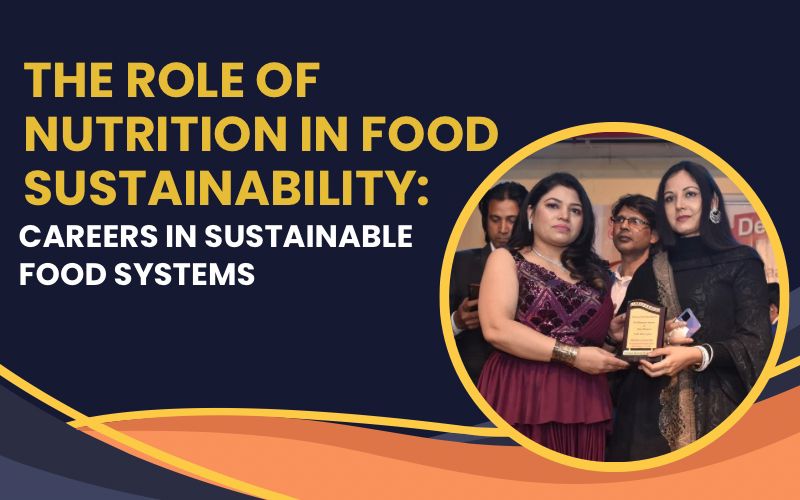In recent years, the concept of food sustainability has gained significant attention as we grapple with the environmental and social implications of our current food systems. At the heart of this discussion lies the role of nutrition, a field that offers various career opportunities for those passionate about making a positive impact on the planet and people’s health.
A diploma in nutrition and dietetics from MeriBindiya International Academy is an excellent starting point for individuals interested in pursuing careers in sustainable food systems. In this blog post, we will explore the intersection of nutrition and food sustainability and highlight some promising career paths for aspiring professionals.
Food sustainability
Food sustainability refers to the practice of producing, distributing, and consuming food in a manner that minimizes environmental impact while ensuring equitable access to nutritious food for all. It encompasses several key aspects, including resource conservation, reduction of food waste, promotion of biodiversity, and the production of healthy and nutritious food.
Nutrition plays a vital role in food sustainability because it directly influences our dietary choices, food production methods, and their subsequent environmental impacts. In food and nutrition courses you will learn this in detail and its implementation.
One of the primary concerns in our current food systems is the overconsumption of resource-intensive foods, such as red meat and processed foods, which contribute to greenhouse gas emissions, deforestation, and water scarcity.
A nutrition course equips individuals with the knowledge to educate and guide individuals and communities towards healthier and more sustainable dietary choices. Nutrition professionals can advocate for plant-based diets, promote locally sourced and seasonal foods, and encourage reduced food waste through proper meal planning and preservation techniques.
Another crucial aspect of food sustainability is the promotion of sustainable farming and production methods. Nutrition professionals can work with farmers, food manufacturers, and policymakers to develop and implement sustainable farming practices that reduce the use of chemical inputs, conserve soil health, and promote biodiversity.
By educating food producers and consumers on the environmental and health benefits of organic farming, regenerative agriculture, and agroforestry, nutrition professionals can contribute to more sustainable food production systems.
Nutrition professionals and food sustainability
In addition to promoting sustainable dietary choices and farming practices, nutrition professionals who have completed their masters in nutrition and dietetics can also work in food policy and advocacy. They can collaborate with government agencies, non-profit organizations, and community groups to develop and implement policies that support sustainable food systems.
This may involve advocating for improved food labeling, implementing nutrition education programs, or influencing food procurement practices in schools, hospitals, and other institutions. By participating in policy development and advocacy, nutrition professionals can drive systemic changes that have a far-reaching impact on food sustainability.
5 Tips To Getting Rid Of Dark Underarms
Moreover, careers in sustainable food systems are not limited to traditional roles in nutrition and dietetics. Professionals with a nutrition certification can also venture into fields such as food entrepreneurship, sustainable food product development, and food waste management.
They can start their own sustainable food businesses, develop innovative plant-based food products, or work with organizations to minimize food waste and redirect surplus food to those in need.
The need for professionals who can bridge the gap between nutrition and food sustainability is growing rapidly. Employers in various sectors, including healthcare, food industry, non-profit organizations, and government agencies, are seeking individuals with a strong foundation in nutrition and an understanding of sustainable food systems.
A diploma in nutrition and dietetics provides a solid educational background and opens doors to a wide range of career opportunities in this emerging field.
How Can Nutrition Professionals Contribute Towards Food Sustainability?
Nutrition professionals with a nutrition degree can play a vital role in promoting food sustainability by guiding individuals and communities towards healthier and more sustainable dietary choices. They can contribute in various ways to create a more sustainable food system. Here are some key ways in which nutrition professionals can make a difference:
Education and Awareness: Nutrition professionals can educate individuals and communities about the environmental and health impacts of their dietary choices. By providing accurate and evidence-based information, they can raise awareness about the benefits of sustainable food choices.
This includes promoting plant-based diets, reducing the consumption of resource-intensive foods, and emphasizing the importance of locally sourced and seasonal foods.
What Are the Questions You Should Ask a Wedding Venue Before Booking?
Menu Planning and Meal Optimization: Nutrition professionals can assist individuals, institutions, and foodservice providers in planning menus that prioritize sustainable food options. They can help develop menus that minimize food waste, incorporate plant-based proteins, and increase the use of sustainable ingredients.
By optimizing nutrient-dense meals, they can ensure that people’s nutritional needs are met while reducing the environmental footprint of food consumption.
Food Labeling and Certification: Nutrition professionals can advocate for improved food labeling systems that provide clear information about the environmental impact of food products. They can work with food manufacturers and regulatory bodies to develop labeling standards that highlight sustainably produced foods.
Additionally, they can support and promote certification programs, such as organic and fair trade, that encourage sustainable practices throughout the supply chain.
Collaboration with Farmers and Food Producers: Nutrition professionals can collaborate with farmers and food producers to develop and implement sustainable farming practices. By promoting organic farming, regenerative agriculture, and agroforestry, they can help reduce the use of chemical inputs, conserve soil health, and promote biodiversity.
They can also support local food systems by advocating for direct partnerships between farmers and consumers, thereby reducing the carbon footprint associated with long-distance transportation.
Policy Development and Advocacy: Nutrition professionals can actively participate in policy development and advocacy efforts to create a supportive environment for sustainable food systems.
They can work with government agencies, non-profit organizations, and community groups to develop and implement policies that promote sustainable food production, reduce food waste, and ensure equitable access to nutritious food. They can also advocate for nutrition education programs in schools, workplaces, and healthcare settings to empower individuals to make informed and sustainable food choices.
Research and Innovation: Nutrition professionals can contribute to research and innovation in sustainable food systems. They can conduct studies to explore the environmental and nutritional impact of different dietary patterns and food production methods. By staying updated with the latest research, they can guide individuals and organizations towards evidence-based practices that promote food sustainability.
KNOW EVERYTHING ABOUT THE NAIL ARTIST CAREER
Community Engagement and Outreach: Nutrition professionals can engage with communities through workshops, seminars, and public speaking engagements. They can collaborate with community organizations to promote sustainable food practices and facilitate behavior change. By empowering individuals with knowledge and skills, they can create a ripple effect that extends beyond their immediate reach.
Wrap Up
In conclusion, the role of nutrition in food sustainability is critical for creating a healthier and more environmentally conscious food system. A diploma in nutrition and dietetics from MeriBindiya International Academy equips individuals with the knowledge and skills to contribute to sustainable food production, promote healthy dietary choices, and advocate for policy changes. As we navigate the challenges of feeding a growing population while preserving our planet’s resources, careers in sustainable food systems offer meaningful and impactful opportunities for those passionate about nutrition and sustainability.
If you are passionate about having a career in beauty industry and are looking forward to enroll in a professional beauty courses that include makeup, nail art, cosmetology, hair stylist, hair dresser, micro blading and much more get in touch with MeriBindiya International Academy. Enroll in our beauty courses that best suits your interest and kickstart your career in the beauty industry.
MERIBINDIYA INTERNATIONAL ACADEMY































